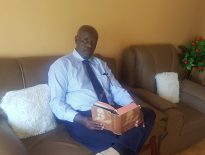Lost in the labyrinth of thoughts, Ikem drifted from their usual evening conversation. He sailed from the throaty laughter of Nnedi; the tiny, chiming, and penetrative voice of Ekene, and he saw himself in a dim; in a distance. Such conversations had illuminated his evenings; a hang-out at the popular Music quadrangle, and their voices filling the whole area of Faculty of Arts. They talked about books with the sharp, eagle eyes of students of English and ended in raucous laughter about an author whom they felt had done his work so badly. They talked about Achebe. Ekene had questioned Chinua Achebe’s compromising stance in not blatantly condemning colonialism. Then, Chimamanda Adichie, and the subtlety of her themes, ‘Ifemelunamma’ springing up here and there in their sentences. But not that evening, when Ikem’s mind was fluctuating, blinking on its own and turning to things that sent lurches to his brain.
It didn’t start that evening. Ikem’s mind had been wandering, lingering on nothingness for three days. He peered at people morosely, nodding when he was required to speak. Nnedi observed that evening. Although, Ikem thought they would know but chose not to speak. But it was that evening that Nnedi’s exuberant self didn’t allow her to swallow whatever she thought – she said to them.
Flashing her haunting eyes that were too tiny for the sockets and her large forehead, she asked, that evening, “You’re not here, Ikem, what are you thinking? A new girlfriend?” she smiled mischievously, showing only her upper teeth, and winked at him.
Despite her guess being far from the truth, Ikem evaporated and felt his tongue swollen with his heart skipping carelessly to his head, back, then to his stomach. Nnedi could know anything and her penetrative stare at him made him feel bare, unclad before her. Nnedi was the vigorous student who held a lecturer at the door of the faculty lecture hall, and registered her disapproval of the lecturer’s statement, which degraded the womenfolk and likened their brains to ‘broken eye liners’; who threatened to report a case of embezzlement by class executive members to the Head of Department. Nobody knew how she found out – Nnedi could know everything. So, Ikem feared.
Ikem glared at Nnedi. His eyes held both water and questions yet unanswered. Nnedi didn’t see the water that stood like Pharaoh’s chariot in his eyes, as she flicked her brows upwards, drew her lips down, and asked, “What do you say about the book?”
Ikem didn’t know what to say, but he had heard them start the evening’s discussion, and he had heard Ekene scream, his voice barely going beyond the Music department building that stood behind them, “Let’s talk about Ifeakandu’s God’s Children Are Little Broken Things!”
And he had heard Nnedi say with a click of the tongue that suggested displeasure and scorn, “That homo story.” It had pinched his heart scathingly and he had swallowed two lumps of thick saliva.
“I don’t like Lotanna,” Ikem said, as he felt the air flushing out of his mouth, uncontrolled. “He loved to a fault. That really broke his heart.” Was that all? He dug his fingers into his thick afro hair and scratched.
It was half-hearted, and Ekene’s blazing eyes and Nnedi’s half-parted lips told him they wanted more. But he couldn’t say anything more. Anything more was another judgment, a compunction; a pricking of the conscience that left a sore, which he knew would take a lifetime to heal.
“If you continue this way, I don’t think you will find it easy in this department,” Nnedi said in her declarative tone that usually came with a supercilious sneer, but no sneer came this time. Her eyes were filled with concern as she turned to face the minibar opposite them. “That was too shallow an assessment for a student of English.”
Ikem knew, but he felt blisters growing on his tongue and his lips, and he couldn’t speak. The wind brushed past them and raised Nnedi’s purple braids, dropping them over her shoulders. The wind brought a chilliness that froze their words for the moment.
“I think indecisive would be better,” Ekene was saying at last.
The Quadrangle was silent now, as the crowd of students had trickled down to a few studious ones boring their eyes over opened textbooks.
Ikem found the word. God bless Ekene. He was indecisive. Yes, ambivalent, but he didn’t know how and why. The emptiness that greeted those questions when he asked them in his mind, set his mind sailing again, as he tried to get the answers from his past.
That evening was uneventful, Nnedi had proclaimed so, as she piled her books and novels on her curved elbow and stamped out grumbling about the next day not to be like that. Ikem’s walk to Hilltop, where he stayed alone, was like a tread on pins, broken bottles and nails – they pierced his soul leaving his legs to wander further in lostness. The cloud had a blueness that was immaculate, and water dripping from the leaves of the trees that lined up on the road on both sides reminded him it had rained heavily that afternoon. Hilltop would be messy and muddy, yet he wanted it somewhat. He wanted to forget, to be forgotten; to immerse his feet in the mud and slip into the unknown. The unknown reminded him of his sister’s frantic call three days back, when it all started – his lostness
Dumebi had screamed immediately he pushed the green icon on his phone to the right and grunted, “Hello.” Her scream reminded him of Aunty Emelda’s scream the night his father died at the hospital. She had screamed while holding his mother and restraining her from screaming too, and screamed when people from the village came to see his father’s corpse before pushing the body into one of those fridges in the morgue.
Dumebi’s message, after her scream had thinned down to sobs, was brief, and she had hung up immediately. “Mama has boils in several parts of her body, and the doctor needs seventy thousand as a deposit. It’s too severe.”
They were punitive words that burned his lips, as he told Nedu, his lodge mate, afterwards. Nedu, who promised to help in the way he could, and whose ‘helping in the way he could’ was calling out a phone number belonging to a sugar daddy. Sugar Daddy! Sugar and Daddy were words he heard when girls left their hostels on Friday nights and returned on Sunday evenings; they were words Aunty Emelda had warned Dumebi against, not him because he was excluded from the bleakest possibility of such thing. Nedu had said them, without looking up from his phone to see the horrendous shock on Ikem’s face. So leisurely. Like it was a common thing. His body was bathed in goose bumps, then shudder, then shivering. He glanced at the fountain near Princess Alexandra Auditorium, and the flow seemed to yell its reprimand.
He was going to do ‘homo’ – a term Nnedi had used that evening. She had said with her left hand on one of the pillars, and her head shaking in repudiation, “I wonder why someone would write a thing like that. Homo! Man loving man, and he did it so unapologetically it is being studied in school. Tufia!” Her upper lip met her nostrils to express the disgust, and she snapped her fingers twice, dumping the ‘thing’ on the heap of grass beside her.
Ekene had smiled coolly, like what Nnedi had said was too trivial and childish; a smile that had made Ikem suspect him to be one of them. He looked girly after all, and was too cautious of his English. To Ikem, that was how they are known. Ekene asked, throwing his head at Nnedi, “Are all those worth it? The rejection? And curses, are they worth it?”
He asked himself now if it was all worth it. If going to Obukpa that night and returning on Sunday like the hostel girls was worth it. If accepting the painful thrusts – they were painful because he had seen the videos on Nedu’s phone with the faces of the receivers creased in deeply felt pains – was worth it. If missing his Saturday writing class, and returning on Sunday with his account slacking with the heaviness of thousands of naira was worth it.
He turned to Freedom Square and a new picture and imagination overwhelmed his mind. Picture of his mother, energetic and resilient, when his father had died, and imagining of her armpits bearing a pus-filled boil, that still appeared on other parts of her body. He imagined her frailness now; her submission to ill-fatedness; her shrivelled self. He saw all these in one click, and his questions were answered – the worthiness of it all. The waters from Freedom Square ran over his feet in chastisement.
Read – Kariakoo – A Short Story by Larry Matoyo, Tanzania
——-
The Writers Space Africa(WSA) Magazine is published by a team of professionals and downloadable for free. If you would like to support our work, please buy us coffee – https://www.buymeacoffee.com/wsamagazine







